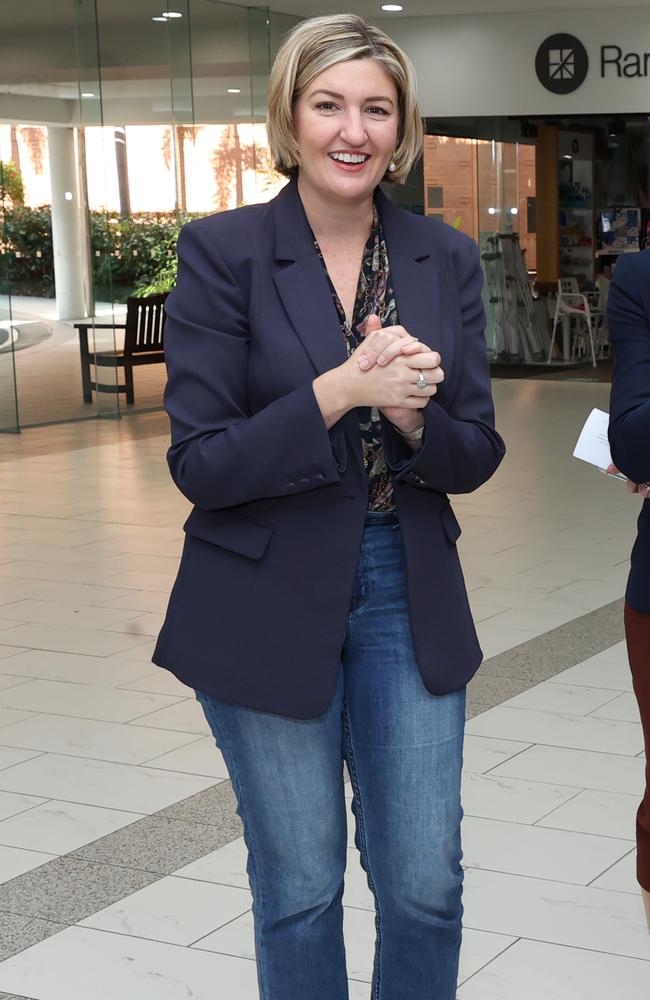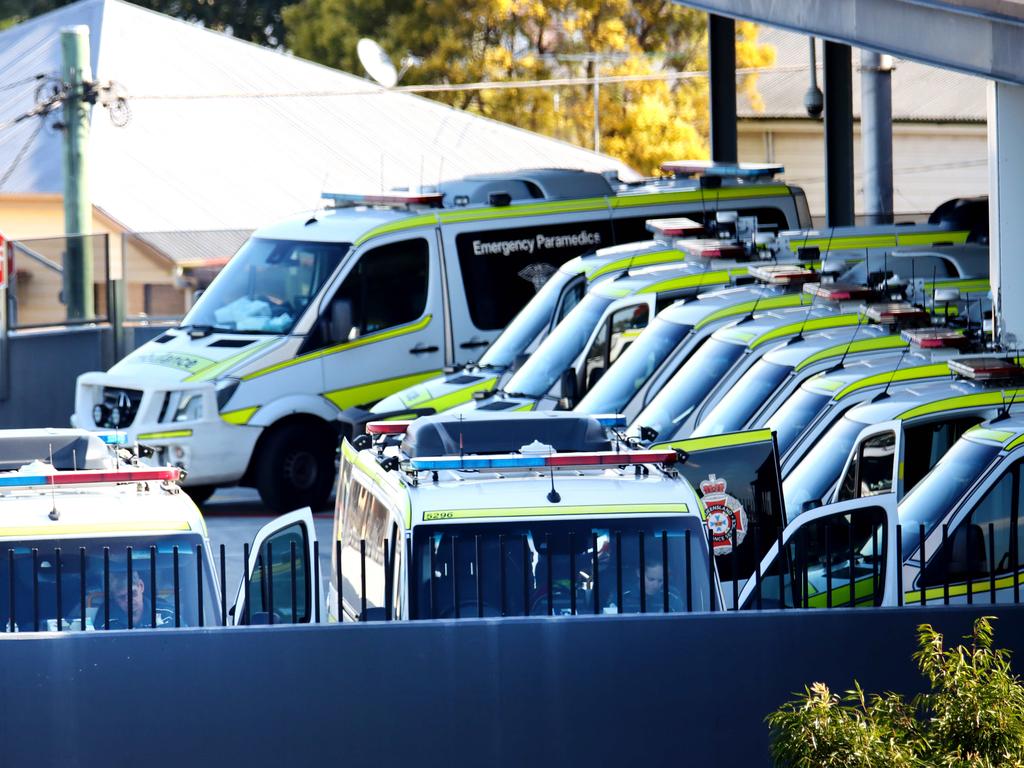Ambo documents blow open true depth of state’s ramping disaster
Queensland ambulance “significant incident” reviews obtained by The Courier-Mail have detailed ongoing health pressures across the southeast.
QLD News
Don't miss out on the headlines from QLD News. Followed categories will be added to My News.
Two patients died while another had a “negative outcome” after waiting too long for ambulances, amid ramping delays up to six hours and increased call centre workloads.
Three Queensland Ambulance Service “significant incident” reviews, obtained by The Courier-Mail through Right to Information laws, have detailed ongoing health pressures across the southeast.
In one case, on January 7 this year, paramedics were called to a male patient who was disoriented and had slurred speech after a fall.
An incident was created at 5.47am with an initial expected response time of six minutes and 29 seconds, but a QAS crew did not arrive on scene until 6.05am – 18 minutes later.
At the time, QAS was “experiencing demand pressures with emergency incidents outstanding in the community” and “prolonged delays” offloading patients at Metro North hospitals.
It was also reported that the delay was due to the call coming in close to a unit’s scheduled 6am finish time.
The delay resulted in a “negative patient outcome”, prompting a QAS officer to be temporarily suspended from acute dispatch duties and a recommendation that code-one incidents should not be delayed close to shift finishing times.
“Code one” denotes the most urgent cases for ambulances, while “escalation level” numbers apply to hospitals.
In another case, at 2.40am on January 25, a request came from an alarm activation for a female patient who was conscious, breathing and had lower back pain.
At 2.43am the case was placed into the queue of the clinical hub, a team of paramedics and clinicians who call back people waiting for an ambulance to see what treatment they may need.

At the time of the incident, the review noted Toowoomba Hospital was at escalation level one and the clinical hub had increased workload.
It also noted an officer on a meal break and a critical care paramedic were not utilised.
A unit was finally dispatched at 3.28am, arriving on scene 10 minutes later but the patient was in cardiac arrest and died at the scene.
Ten days later, on February 2, a male patient complaining of chest pain and shortness of breath died after there was a delay in identifying an appropriate ambulance to respond due to “high workload” at the time of call.
At the time, the review found the Metro South Hospital and Health Service had sustained pressures with four hospitals on level-three escalation, with delays of over six hours to offload ambulance patients.
West Moreton HHS also had sustained pressures, with Ipswich Hospital on a QAS level three escalation, with delays in offloading patients over four hours.
It was also noted there had been “extensive and sustained pressure” across the HHS throughout the week leading up to and the day of the incident, with senior QAS staff engaging with HHS executives over the impact.
The three reviews do not reveal if the ambulance delays could have resulted in a different outcome for each patient, only that there were call handling, deployment and external pressures noted in each case.
QAS responds to around 1.3 million incidents per year, with the busiest day for calls in 2024 so far on February 26, when 4028 were made to triple-0. Between July 2023 and March, officers attended over 2900 code one and two incidents per day and transported over 3000 patients.
QAS deputy medical director Claire Bertenshaw said operations centre staff were “all people who care very deeply for our patients”.
“It is challenging and we do the best we can with the resources we have,” she said.
“We’ve got our operation supervisors that will try and clear people off the ramps and clear beds.
“We will find someone to send and we will provide support to that patient while they’re waiting. It’s the same as being on road, bad things occasionally happen.”

Dr Bertenshaw said the clinical hub, which began operating in 2019 to ease ambulance pressures during Covid-19, was continuing to make a difference to patient care.
“I think we found our role because the service needed the ability to provide care while they’re waiting for an ambulance,” she said. “(The hub) has worked and it will continue to grow as the service and the community needs us.”
United Workers Union national ambulance co-ordinator Fiona Scalon said demand for services and the time crews spent waiting for patients to transfer into emergency departments was having a significant impact on their members.
She said up to 600 hours a day were being lost by ambulances to hospital ramping, the equivalent of up to 50 crews.
“When there is a pending queue of patients who have called triple-0 and no available resource to send it can be extremely stressful,” she said
Ms Scalon said that, over the past six months, staffing had increased in the clinical hub but demand for ambulance services was relentless.
“When there are more patients than available resources it means our members on the road do not have access to breaks across their shifts,” she said. “The almost constant pending queue means our members often have their shifts extended being dispatched to jobs minutes before the end of their shift or emergency code ones after the end of their shift, resulting in two to three-hour shift extensions on a regular basis.”
A spokeswoman for Health Minister Shannon Fentiman said Queensland had the busiest ambulance service and some of the best response times in the country.
“We are the only mainland state to offer ambulance services free of charge,” she said.
The 2024-25 state budget had $129.5m for 268 new QAS staff, including specialist positions for the clinical hub.
CASE STUDIES
EXTRACTS OF QAS SIGNIFICANT INCIDENT REVIEWS FOR SOUTH EAST QUEENSLAND (Sunshine Coast, Greater Brisbane, Ipswich, Gold Coast, Toowoomba)
Date range: 21/11/2023 – 31/05/2024
PATIENT 1
Date: January 7, 2024
Region: Metro North
Executive summary: Male patient, post fall, disoriented and slurred speech. Post incident review due to negative patient outcome identified incorrect dispatch of appropriate unit care prior to finishing shift.
Call handling / Deployment issues: The Triple Zero calls for this incident were reviewed with an appropriate response and nil issues identified with either triple-0 call. Dispatch of clinical response not consistent with (guidelines), computer aided dispatch (CAD) recommend response not followed by emergency medical dispatcher (EMD), notes in the incident detail review indicate dispatch was held pending review by clinical deployment supervisor (CDS), EMD initiated CDS review as recommended unit was a 6am finish. There was a delay of 11 minutes and 32 seconds from the incident being created at 5.47am to the initial dispatch. The expected response time was 6 minutes and 29 seconds. The actual response time was 18 minutes and 36 seconds. (Crew) at scene at 6.05am. The reason for the delay was that the initial recommendation was not followed and appropriate unit dispatched. Follow up occurred with dispatcher with A/Director for reasoning of non dispatch and support provided through the professional development unit (PDU) regarding dispatch of resources to high acuity incidents. Further follow up occurred with Brisbane Operations Centre all staff with advice provided regarding to mandatory dispatch of high acuity incidents close to end of shift.
External: Experiencing demand pressures with emergency incidents outstanding in the community. Prolonged delays noted in awaiting offload of patients within the Hospital Health Service.
Recommendation/s: Working with dispatcher cohort one-on-one to enhance dispatch decision making. Officer temporarily suspended from Acute Dispatch duties and education to Operations Centre, as per direction by the Acting Commissioner. Code 1 incidents close to finishing times must not be held under any circumstances for shift logons. The closest recommended response needs to be dispatched and then appropriate backup units can be dispatched as required.
PATIENT 2
Date: January 25, 2024
Region: Darling Downs and South West
Executive summary: At 2:40am the Brisbane Operations Centre received a Request for Service from an alarm activation for a female conscious, breathing, lower back pain since last night. The call was placed into Clinical Hub waiting queue at 2:43am and then reassigned for acute dispatch at 3:12am, due to workload in the Clinical Hub. A unit was dispatched at 3:28am, arriving on scene at 3:38am with the patient found to be in cardiac arrest, patient declared deceased on scene.
Call handling / Deployment issues:
Quality Assurance has been undertaken of the triple-0 call, with no issues identified. The incident was received at Brisbane Operations Centre from a 3rd party medical alert device, with limited information provided to EMD. EMD attempted call back to patient with no answer or ability to leave voicemail. Call referred to clinical hub, however unable to review case due to workload, referred for acute dispatch. Toowoomba OpCen utilised recommend function in CAD, recommended single officer who was on a meal break and critical care paramedic (CCP) was also available. EMD requested supervisor to review dispatch, however there was no evidence of decision in incident detail report (IDR). Single Officer and CCP not utilised, paramedic crew dispatched at 3.28am.
External: Toowoomba Base Hospital at Escalation Level 1 at time of Incident. Clinical Hub had increased workload.
Recommendation/s:
OpCen and EMD to review SOP01.18 incident call back and SOP03.3 Notification of Senior Officers and feedback to be given.
PATIENT 3
Date: February 2, 2024
Region: Metro South
Executive summary: Male patient, complaining of chest pain and shortness of breath.
Delay in identifying an appropriate ambulance to respond due to high workload at the time of call. Post arrival of QAS, the patient went into a cardiac arrest, resulting in resuscitation being commenced. Despite resuscitation efforts patient was declared deceased at scene. Operational Readiness review identified some night shift vacancies across the region, however these were appropriately offset with the addition of twilight shifts ensuring coverage was maintained.
Call Handling / Deployment review identified that the question around difficulty speaking between breaths was subjective and that the initial response code would have been altered if this question was answered differently.
External Pressures review identified that they was significant hospital pressures at the time of the incident and the week leading up.
Operational readiness issues:
Staffing across Metro North and Metro South Regions was appropriate with the additions of Twilight shifts covering any night shift shortfalls.
Call handling / Deployment issues:
A review of the initial triple-0 (000) call identified the 1st party caller indicates his breathing is rapid. There is some audible shortness of breath at times. However, also able to speak in full sentences at times, which would not necessarily meet the MPDS definition. This question requires the EMD to make a subjective cal, based on what they can hear. The initial response code would have been altered if this question was answered differently.
PDO to discuss this with the EMD and provide education around shifting subjective threshold to a more conservative position.
External: Metro South HHS had sustained pressures with 4 Hospitals on a QAS Level 3 escalation. Delays of over 6 hours to offload ambulance patients was noted. West Moreton HHS also had sustained pressures with Ipswich Hospital on a QAS Level 3 escalation and delays in offloading over 4 hours. Extensive and sustained pressure across the HHS throughout the week leading up to and the day of the incident. QAS Managers and Executives had continual engagement with HHS Executives regarding the impacts.
Recommendation/s:
At the time of the incident, Metro South Region was undertaking a realignment of rosters to the resource allocation model to ensure staffing is appropriate. Feedback and training provided to EMD in line with findings of call handling review.
Originally published as Ambo documents blow open true depth of state’s ramping disaster






